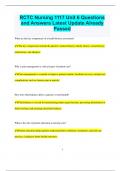RCTC Nursing 1117 Unit 6 Questions
and Answers Latest Update Already
Passed
What are the key components of a health history assessment?
✔✔The key components include the patient’s medical history, family history, social history,
medications, and allergies.
Why is pain management a critical aspect of patient care?
✔✔Pain management is essential to improve patient comfort, facilitate recovery, and prevent
complications such as chronic pain or anxiety.
How does fluid balance affect a patient's overall health?
✔✔Fluid balance is crucial for maintaining proper organ function, preventing dehydration or
fluid overload, and ensuring electrolyte balance.
What is the role of patient education in nursing care?
✔✔Patient education helps patients understand their conditions, treatments, and self-care
practices, leading to better health outcomes.
1
,Why is it important to monitor a patient’s nutritional status?
✔✔Monitoring nutritional status is important to ensure that the patient receives adequate
nutrients for healing, energy, and overall health maintenance.
How does a nurse determine the priority of patient care needs?
✔✔A nurse determines priority based on the severity of symptoms, potential complications, and
the overall impact on the patient’s health and well-being.
What is the significance of skin integrity in nursing assessments?
✔✔Assessing skin integrity helps identify risks for pressure ulcers, infections, and other
complications, enabling timely interventions.
How can a nurse support a patient’s psychosocial needs?
✔✔A nurse can support psychosocial needs by providing emotional support, listening actively,
and connecting patients with appropriate resources or support systems.
What is the importance of monitoring a patient’s respiratory status?
✔✔Monitoring respiratory status is vital to detect early signs of respiratory distress, ensure
adequate oxygenation, and prevent complications.
2
,How does effective time management benefit nursing practice?
✔✔Effective time management allows nurses to provide timely care, reduce stress, and ensure
that all patient needs are met efficiently.
What is the role of nursing in patient advocacy?
✔✔Nurses advocate for patients by ensuring their needs and preferences are respected,
safeguarding their rights, and facilitating communication with other healthcare providers.
How does a nurse assess a patient’s level of consciousness?
✔✔A nurse assesses level of consciousness by evaluating the patient’s alertness, orientation to
time, place, and person, and response to stimuli.
What are the steps involved in performing a head-to-toe assessment?
✔✔The steps include inspecting, palpating, auscultating, and percussing various body systems,
starting from the head and moving down to the toes.
Why is it important to evaluate the effectiveness of nursing interventions?
3
, ✔✔Evaluating the effectiveness ensures that care goals are being met, allows for adjustments to
the care plan, and improves patient outcomes.
How does the Nursing Process apply in patient care?
✔✔The Nursing Process provides a systematic approach to assess, diagnose, plan, implement,
and evaluate patient care.
What is the significance of patient assessment in nursing?
✔✔Patient assessment is crucial for identifying patient needs, monitoring progress, and guiding
effective care planning.
Why is understanding pharmacology important in Nursing 1?
✔✔Understanding pharmacology is essential to ensure safe administration of medications and to
recognize potential side effects and interactions.
What role does communication play in patient care?
✔✔Effective communication is vital for building trust, ensuring patient understanding, and
coordinating care among healthcare team members.
4




